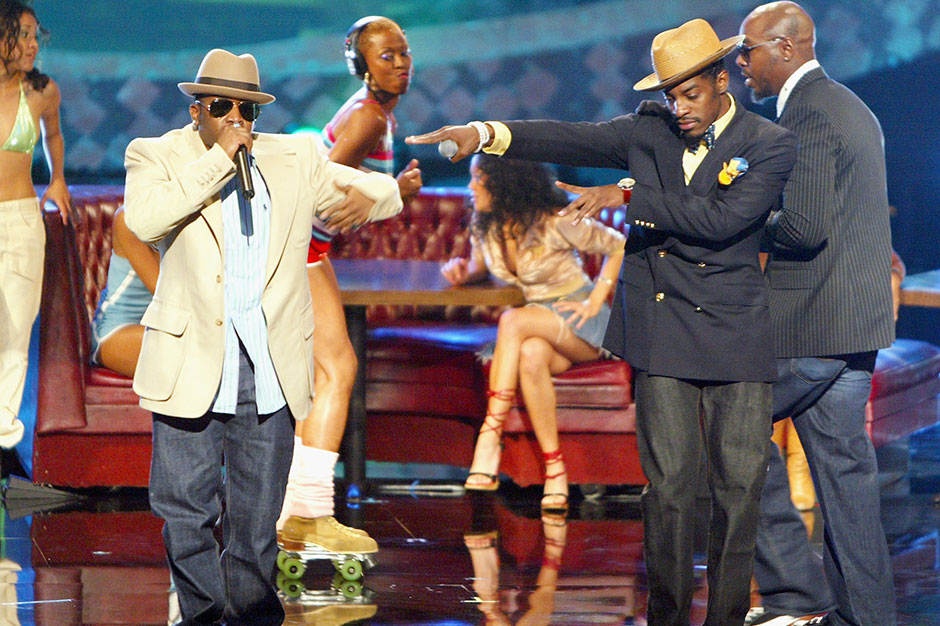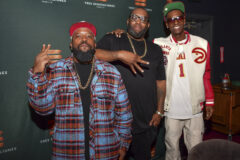Ten years ago this week, OutKast’s Speakerboxxx/The Love Below arrived. The double album isn’t the best OutKast record (that’s ATLiens) or even their most influential (that’s Aquemini), though it is the most successful (it has sold more than 11 million copies, won the Grammy for Album of the Year), and perhaps most importantly, the hardest one to unpack. It’s a weird project, all right — one whose success hangs on two absolutely perfect singles (Andre 3000’s “Hey Ya,” an acoustic-soul sing-along, and Big Boi’s “The Way You Move,” a grown-and-sexy, fast-rap slow jam); and one whose reputation is fueled by its obnoxious, unmatched ambition (more than two hours of music, which delivered everything other than what longtime fans desired).
Speakerboxxx/The Love Below split OutKast in half: On one disc, Big Boi, the greasy funkdafied street dude with his ears a little more open than most; and on the second, Andre, eccentric, ethical hip-hop dandy, not being all that “hip-hop” anymore. Big Boi’s disc is more focused than The Love Below, holding tight to Dirty South 808 skitters and merging them with psychedelic rap. It was safer (relatively speaking) and had less lows (and maybe more highs), yet it still wasn’t in-the-pocket OutKast, either. Speakerboxxx felt like OutKast cuts as sketches, devoid of proggy flourishes and mired in spare P-Funk-tinged boogie. “Ghettomusick” jumped from gnarly Miami Bass pulses to a blunted Patti Labelle sample and back again, giving everybody getting down a breather; “Flip Flop Rock,” featuring Killer Mike and Jay-Z, ties Eddie Hazel guitar meandering around spare Timbaland-like bounce.
The Love Below was a Prince-wanky, neo-soul hot mess, wandering from idea to idea, only grounded by “Hey Ya,” which sounded edgy-indie and Disney-pop at the same time, and “Roses,” a tempered R&B love song with a Frank Zappa-like hook (“I know you like to think your shit don’t stink / But lean a little closer / See that roses really smell like poo-poo”). The “highlights” turned out to be the most inexplicable moments, like say, an electronic instrumental cover of “My Favorite Things” that injected Squarepusher jazz-wazz drum n’ bass into samples of John Coltrane’s definitive version of the standard. It was the kind of composition that should’ve never escaped the studio, but that’s exactly why it was so exciting.
What makes Speakerboxxx/The Love Below so exciting now is what made it so frustrating at the time: There’s not even one proper OutKast record spread across these two discs. At the time of its release, there was talk of Andre and Big Boi as John Lennon and Paul McCartney, and Speakerboxxx/The Love Below as the White Album, if John and Paul didn’t trade off tracks, but that isn’t accurate at all. You can’t cherry-pick favorites from each of these solo albums and comfortably place them next to one another. If each disc were trimmed of its fat, you’d possibly be left with two incredible 40-minute solo albums, but that still doesn’t leave you with an OutKast album, good and proper.
Despite the huge success of the album and the creative spirit coursing through it, it’s hard not to see Speakerboxxx/The Love Below as something of a missed opportunity. The idea of the record remains more exciting than the actual experience of listening to it. And the group’s disinterest in keeping OutKast alive afterwards really stung because it seemed like, for a moment there in 2004, “conscious hip-hop” was breaking into the mainstream with Andre and Big Boi’s help. Mind you, binary-breaking female MC Missy Elliot was also huge at the time and Chappelle’s Show was a cultural phenomenon. Besides the show’s caustic and clever take on race relations, each show featured a musical guest straight out of the underground (Mos Def, Common, dead prez).
Kanye West’s The College Dropout , which would dead po-faced undie rap didacticism for good, arrived in February of 2004, and by that summer of 2004, with Speakerboxxx/The Love Below singles still floating around, Jadakiss released a political missive called “Why?,” which suggests, among other things, that perhaps George Bush was privy to information about the World Trade Center attacks. That’s radical! But OutKast didn’t keep up their superstar momentum, Dave Chappelle would end his show in 2005, and grousing real-hip-hop heads were more concerned about the problem of raucous Atlanta crunk than this strange conscious-rap-as-mainstream flashpoint. Or maybe it all failed because jerks like me wanted it to happen so damned bad and put a lot of pressure on another round of black artists.
Consider Speakerboxxx/The Love Below as the formal end of OutKast. Idlewild, the 2006 follow-up, tied to their not-very-good-no-matter-how you-slice-it theatrical musical, was sloppy rather than messy. We’re still trying to figure out this double album; there’s nothing to figure out about Idlewild. Plus, both discs, without making a big deal out of it — tough to do because OutKast were at a point in their career where everything they did was viewed as some kind of statement — informed fans as to where each member was headed in terms of solo work. Big Boi’s dirty south-art rock fusion would continue onto Sir Lucious Left Foot and Vicious Lies and Dangerous Rumors. Recall too that Andre ended The Love Below with the rap track. “A Life In the Day of Benjamin Andre (Incomplete),” a stumbling, breathless, soul-baring ramble that tells the history of OutKast, Andre’s maturation, and celebrates the child he raised with Erykah Badu. The rare times when Andre pops up these days to rap on a remix or dole out a guest verse (which by the way, is totally fine; it’s not his duty to give us rap music) is very much in the style of “A Life In the Day.”
And although Speakerboxxx/The Love Below didn’t shift the hip-hop paradigm immediately, it’s clear now that it planted the seeds for the next generation of tradition-bucking hip-hop. The strange kitchen-sink dance-rap of Speakerboxxx, which found room for quiet storm, boogie, ’80s yacht rock, George Duke disco larks, and more, reflects the Internet rapper/producer desire to reinvent as many sounds possible. Specifically, the trippy crunk tics of what is currently being called “New ATL” are all over Big Boi’s disc.
Rap’s past decade of unconventional personalities can be traced directly back to Andre 3000. He bucked rap’s normative masculinity (and came out a sex symbol anyways), matched his empathy for the streets with a no-nonsense, “just grow up” ‘tude towards crack-slanging knuckleheads, and made it okay to croon and fly your freak flag. Rap jumped from Andre to Kanye to mixtape-era Lil Wayne to Drake to Lil B to a whole Internet explosion of oddballs. The trollish cover of The Love Below — Andre gripping a Pepto-Bismol pink pistol — becomes Kanye rocking a pink polo, becomes the Based God waving around a pink bandana and calling himself “pretty.” That Cam’ron, who popularized “no homo” and presented himself as an unrepentant crack-dealing maniac, was wearing pink fur (circa 2003-4) only cemented Three Stacks’ all-encompassing influence.
Speakerboxxx/The Love Below makes a case for Big Boi as perpetually underrated and his own kind of worker-bee visionary, while also celebrating Andre 3000 for naively indulging his strange whims and indulgences. Even the solo split doesn’t enable an easy or digestible listen. It’s critique-proof. A half-crazed masterpiece. One that surprised everybody with where it went, but also appeared to be a canny, deeply considered slab of critic-bait that invoked the “classic album” sprawl of Stevie Wonder’s Songs in the Key of Life and Prince’s Sign O’ the Times.
Compare Speakerboxxx/The Love Below to other rap double albums like the Wu Tang Clan’s Forever or Notorious B.I.G.’s Life After Death, both singular, well-honed, dick-swinging statements of purpose intent on overwhelming the world, and you truly see how much of an all-over-the-place sore thumb that OutKast’s album really was. On Speakerboxxx/The Love Below, OutKast did whatever the hell they felt like doing. For better and worse, there’s nothing else like it in the hip-hop canon.





